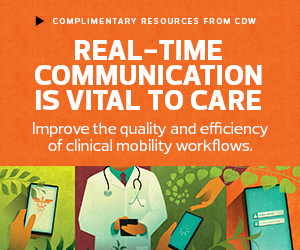Identifying the Tool You Need
Finding the right clinical collaboration solution can be a challenge for many healthcare organizations. A healthcare provider’s IT team may want to deploy one tool, but if clinicians aren’t comfortable with the chosen solution, they may get frustrated and rely on other methods to communicate with their peers. In this scenario, poor communication between an organization’s IT department and its clinical staff can degrade the care that patients receive.
A third party can help get IT professionals and clinicians aligned and establish a framework for effective collaboration. For example, CDW offers a Clinical Mobility Workshop that can help healthcare organizations find solutions that meet the needs of both clinical and IT staff.
During the workshop, CDW experts conduct focus groups with both clinical and IT personnel and perform clinical workflow assessments. The process helps an organization determine what is working within its clinical communication environment and workflows — and what needs improvement. By working with different groups within a healthcare organization, such as nurses, therapists, emergency department staff and intensive care clinicians, CDW’s experts can identify patterns among clinicians concerning their needs and how they’re using the clinical communication tools at their disposal.
From these focus groups, CDW establishes a statement of understanding based on the organization’s targeted outcomes, current experiences and challenges, then delivers clinical and IT recommendations on how to move forward with collaboration tools. The document describes the current experience of specific clinicians within the organization and details the challenges they face on a daily basis, such as where workflows may be slowed and where communication may break down. The statement then spells out the experience that users expect from their clinical collaboration system and provides recommendations for how to achieve these outcomes.
A Clear Way Forward for Clinical Collaboration
Ultimately, a Clinical Mobility Workshop can help healthcare organizations improve communication between caregivers and patients while also enhancing the use of information from healthcare technologies such as telemetry monitoring and bedside vitals. Further, when clinicians are involved in the decision about which tools are implemented for clinical collaboration, they are more likely to use them, helping to overcome the common challenge of adoption.
As clinical communication and collaboration grow in importance, the use of clinical mobility tools will only grow in the next few years. These solutions will have a greater overall impact on care, so healthcare organizations must use them strategically. A Clinical Mobility Workshop can help organizations make better decisions regarding these tools and ensure they meet their needs for communication and care.
This article is part of HealthTech’s MonITor blog series. Please join the discussion on Twitter by using #WellnessIT.












